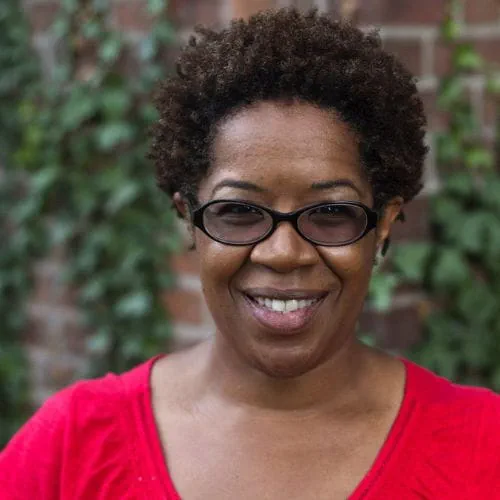In 2021, Lori Chambers’ sister was diagnosed with breast cancer and Lori became her caregiver. Lori saw firsthand the experience, and inequities of cancer care in Canada. She remembers picking up her sister from treatment and talking about how much time it took for cancer care. Lori thought about how difficult it must be for people who couldn’t take sick leave to schedule and travel to appointments. And how some people don’t have a loved one who can act as a caregiver.

Seeing inequity in cancer care
When Lori was a caregiver, she recognized more issues that could create barriers for people affected by cancer. As she helped her sister shop for wigs, scarves, post-surgery bras, and over-the-counter medication, she thought about how difficult it must be for someone precariously employed to manage expenses not covered by government health insurance. As she travelled to and from appointments, she thought about how difficult it must be for people in smaller communities to travel for treatment and take time away from their lives and families. And as a Black woman with a community health research background, she was surprised by the lack of Canadian research on cancer in Black communities. Doctors would refer to American studies, but as a Black Canadian Lori’s sister’s experience was different from the American experience.
Health inequities in cancer care are not just a gap; they are a chasm. If we don’t dedicate funding toward them, how will we develop the appropriate knowledge to transform our system to be inclusive for all?
During her time as a caregiver, Lori learned about the Canadian Cancer Society (CCS) from a friend and contacted them for resources to share with her sister. She told CCS about her background in HIV research with racialized women and that she would be interested in research-related opportunities as a patient partner. Lori had a chance to contribute her knowledge as a researcher and patient partner when she was invited to co-design the Health Equity Research Grants funding opportunity.
Reducing cancer-related health inequities through research
CCS is investing up to $9 million in the Health Equity Research Grants, which aim to improve the lives of people in Canada by reducing cancer-related health inequities faced by underserved communities. During the grant program’s development, patient partners like Lori were invited to give feedback and co-create the final version of the grant program. Lori found the experience of working to create the Health Equity Research Grants very collaborative. The team of patient partners included many people, who, like Lori, have had lived experience with cancer and inequity. They worked individually and as a group to provide feedback. “I provided three pages of comments, with the first page focusing on the language I didn't like in the proposal as it seemed exclusionary and overly clinical. The heading I used in my comments was ‘Certain words in grants tend to get my back up.’ Judit (CCS Senior manager, research partnerships and engagement) called me to go through every comment I made – and I made so many comments! – and as she asked questions I thought, 'Wow, they really want to make this program inclusive.’”
Lori understands the importance of making sure that cancer care and health access are available to everyone, and with programs like the Health Equity Research Grants, CCS is taking a step toward making that possible. “Health inequities in cancer care are not just a gap; they are a chasm. If we don’t dedicate funding toward them, how will we develop the appropriate knowledge to transform our system to be inclusive for all? For me, the Health Equity Research Grants mean that organizations such as CCS are creating greater space for diverse perspectives in health, not just research on equity, but funding opportunities that are more inclusive and encourage diversity of methodologies, research questions, populations of interest, and knowledge generated. We will all benefit from that diversity.”
You can transform the future of health equity in Canada
The work done by patient partners like Lori helped create CCS’s first funding stream that specifically targets the many challenges encountered in providing equitable, timely and affordable access to cancer prevention and care. The Health Equity Research Grants were made possible through the support of donors from across Canada. Six projects were funded through the program in 2023 and CCS expects to fund up to 20 more in 2024. By donating today you can help us continue to advance health equity and transform the future of cancer in Canada for everyone.
